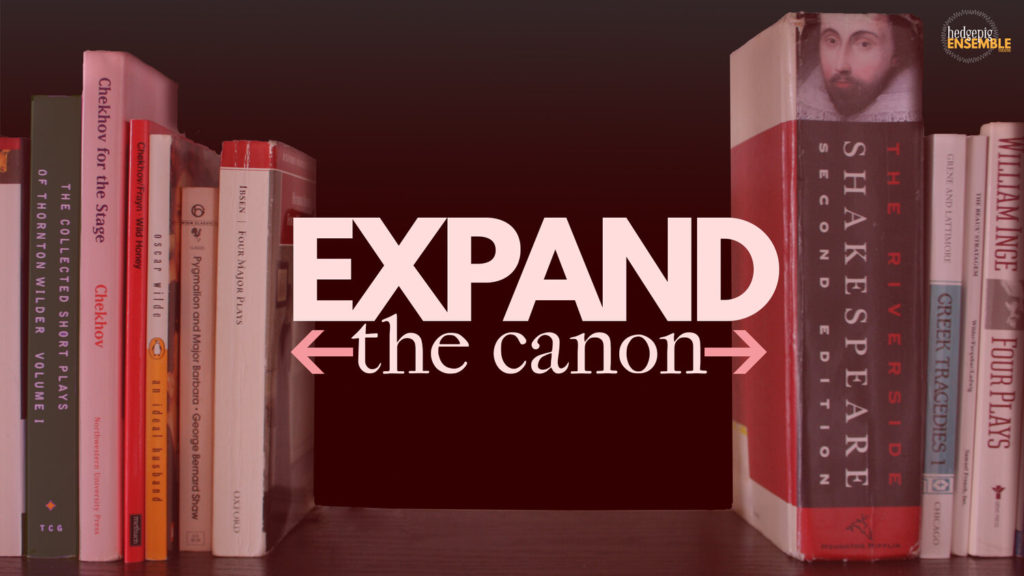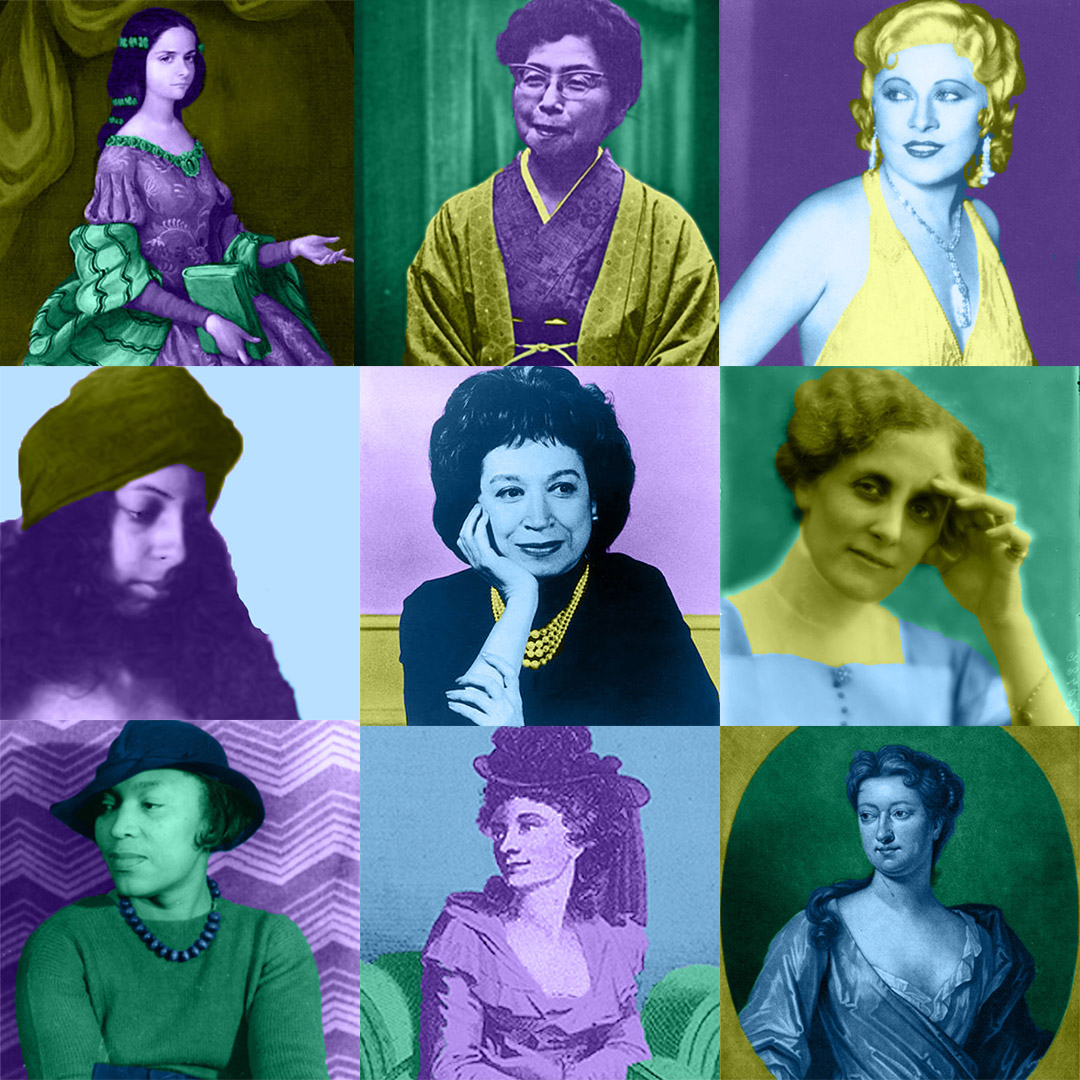The plays have always existed, the productions have not. With their ‘Expand the Canon’ project, Hedgepig Ensemble seeks to celebrate underproduced classics by women and non-binary writers, while calling theaters everywhere to reevaluate their perspective on the classical play canon. The initiative publishes a yearly list of the most exceptional, timely, and highly “producible” examples of these works, intended for institutions everywhere to reference in their curriculum-making and season-planning. It’s a catalog vetted through a large reading committee, an advisory committee, and a curatorial team which includes R&D group member Emily Lyon. (Who also designed the above artwork.)
Lyon is presently working with The Civilians as a member of the 2020-2021 R&D group. She’s teamed up with Reynaldo Piniella on Dissentary, a theatrical experience/card game that’s something of an environmental justice take on the Oregon Trail. (Expect more on Dissentary in The R&D Group’s “Findings Series” on Extended Play.)
Hedgepig, with its storied Scottish-Play-Inspired name, is a theater collective that seeks to elevate the voices of women by reimagining the classics.
As for Hedgepig Ensemble, Lyon became involved in 2013 and currently serves as the group’s Associate Artistic Director. Hedgepig, with its storied Scottish-Play-Inspired name, is a theater collective that seeks to elevate the voices of women by reimagining the classics. Their mission was a natural fit for Lyon, who attributes her initial interest in feminist classical theater to a (frustrated) connection with Midsummer’s Helena.
“I would see version after version after version [of A Midsummer Night’s Dream], and every single time Helena was just the butt of the joke. She would get on her knees and beg for Demetrius to kick her, spur her, strike her and I thought – I don’t know any women like this.
So, when I later directed Midsummer, I was really conscious of wanting to make sure not only that Helena was funny – but was a woman that I recognized. That’s the lens I have been looking at Shakespeare and directing and dramaturgy through – cutting these scripts, so they work for a modern audience such that all people, including female and nonbinary folx, are represented as fully fleshed-out humans. And that’s what I’ve found at Hedgepig.”
And indeed, since 2011, the Ensemble has chased this goal. They’ve produced cabarets, adaptations, re-cuttings, and fully realized version of classical texts – with the intention of finding empowerment, empathy, and nuance in all of the characters represented.

“Expand the Canon” grew out of a crossroads the company reached with their 2018/2019 season, which included All’s Well That Ends Well and Mary Stuart. Lyon describes the group’s frustration at the lack of women characters in All’s Well (among other things), and further said that she found a reckoning in her direction of Mary Stuart – a play ostensibly about two empowered women which was both written and translated by a man. It became evident to the company that there was a hunger for women and non-binary characters written by women and non-binary writers. This desire, along with the realization that those writers had previously only been represented in Hedgepig via adaptation of male-penned works, sparked an interest in uncovering classic texts written by underrepresented genders.
In their search, Hedgepig discovered a gap not only in the aforementioned lack of representation, but also in the of accessibility of the information available. “There are these huge, long lists of plays by women, but because they aren’t produced very often – we didn’t know where to start. Which are the good ones? Which ones are relevant? We got overwhelmed.” They also had difficulty in obtaining the texts themselves and in finding information regarding licensing, challenges which would ultimately crystalize the goals of the subsequent project that emerged.
Like something of a classical echo of the Kilroy’s list, the ‘Expand the Canon’ list presents classical plays by women and non-binary writers that are not only undeniably ready for production, but also timely and relevant to contemporary audiences.
Their intention shifted, then, from finding a play to produce to cultivating a list of plays. Like something of a classical echo of the Kilroy’s list (of which Lyon has been a contributor) the ‘Expand the Canon’ list presents classical plays by women and non-binary writers that were not only undeniably ready for production, but also timely and relevant to contemporary audiences. These plays are made unquestionably present, available, and easily accessible for people everywhere.
Further, Hedgepig commits that the list reflect the diversity of classical writers. “[We wanted to] not just shift the classical canon from dead white dudes to dead white ladies. We want it to be a space that is truly representative, and that honors the truth of these people – that there have been these writers and these voices that we just haven’t been recognizing.” Commented Lyon. This meant in some cases expanding the definition of “classical” past the public-domain-era. It also meant acknowledging the Eurocentric-limitations of texts available (even by translation) in English, and text-based-theater as a form. The company still grapples with these limitations, and for the 2021 list has placed a specific emphasis on bilingual readers who might be able to adjudicate otherwise-inaccessible works.
The reconnaissance for the 2020 list began through a recommendation-based system and quickly shifted to a research project for the company and its affiliates. Through intensive digging in libraries, out-of-print-anthologies, footnotes of theses, and anywhere these plays might be referenced the group compiled a list of six-hundred potential titles, one-hundred-and-fifty of which were evaluated for the 2020 list. (The remaining titles are currently being adjudicated for the 2021 list, and the investigation into potential titles is constant and ongoing.) This massive effort resulted in the publication of the first ‘Expand the Canon’ list in the summer of 2020.
The 2020 list for ‘Expand the Canon’ includes:
- House of Desires by Sor Juana Inés de la Cruz
- Bold Stroke for a Wife by Susanna Centlivre
- Bold Stroke for a Husband by Hannah Cowley
- Anima (or Her Soul) by Amelia P. Rosselli
- Rachel by Angelina Weld Grimké
- The Drag by Mae West
- Restless Night in Late Spring & A Hell of Her Own by Fumiko Enchi
- Spunk by Zora Neale Hurston
- Wedding Band: A Love Story in Black and White by Alice Childress
The 2020 list includes casting, production, and licensing considerations, suggested cuts, author bios, as well as a succinct blurbs regarding “why now.” Lyon cites The Wedding Band as a particularly relevant recommendation and Enchi’s one-acts as an unexpected and fruitful find. The company partnered with Ma-Yi Theater Company, American Players Theater, and The Classical Theatre of Harlem earlier in 2020 to produce a series of readings related to the 2020 list, and some of the titles have already begun to find their way into the programming of theaters across the country. Celebration, recognition, and investigation is the hope.
“My hope is that these plays are taught [and produced] alongside Shakespeare, alongside Chekhov…that we see the depth and breadth of who was writing, and what.” Concluded Lyon. “Part of the point is that there is a legacy here…that women of all colors have history.”
The 2021 list is currently under curation and will be released later in the year. If you’re interested in learning more about the company (or if you want to help contribute to the list) you can follow Hedgepig @HegdepigEnsembleTheater or subscribe to the Hedgepig Newsletter on their website. Updates about the list, including the 2021 Reading Festival, will be found in these locations and announced via a follow-up article on Extended Play.
Author
-

James La Bella (he/him) is a writer and performer from New England. He earned his BFA from Emerson College, with additional coursework completed at Harvard University. Jameslabella.com
View all posts









